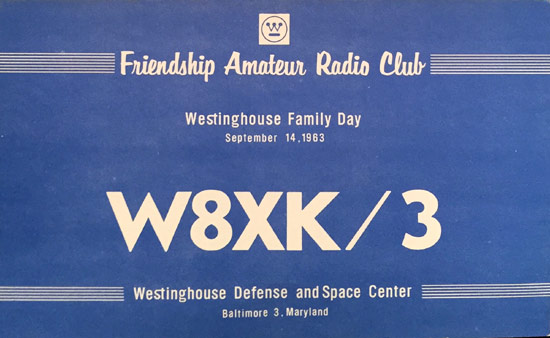


W8XK/3 1963 Baltimore, Maryland
Westinghouse Family Day
Westinghouse Defense and Space Center
In the mid 1950's the Westinghouse
operations in the Baltimore area were in many locations. A major
new facility was built at the Friendship Airport for expanding
business in Airborne Radar and drawing on engineers and
technicians from area plants and a major hiring campaign. Many of
these people were Amateurs and they got together and formed the
non-exclusive Friendship Amateur Radio Club (FARC) that also
included amateurs from nearby Fort Meade.
With many members having been associated with Westinghouse in
other locations the roll of Westinghouse in the history of radio
was appreciated by the new club. In a special event station the
call W8XK/3 was granted to FARC. This was significant as a
reminder of 8XK which was the amateur call of Frank Conrad and
was the station that first broadcast radio commercially and
became KDKA.
This club met primarily in the homes of the members and
eventually established a tradition of a robust Field Day and a
very helpful approach to new amateurs. As the Westinghouse
Defense Center grew to encompass new plants at the Friendship
Site and expand to other locations, FARC grew. A downturn in the
late 1960's and the retirement of many notable member hams
resulted in a smaller and less active club. In 1992 Ernie Farkas
K3CBW, Dale Cochran W3UG, Freeman Fruge' W3YBB, Cam Marie' W3EPL,
Joe Meagher N3JKT, Gary Ryan W3GYM, Chip Weems W4PBG and others
recognized the value of the Historical Electronics Museum as an
ideal focus for a revival of the FARC and the Museum passed a
resolution making the ham club an independent organization within
the framework of the Museum. The club was chartered in March of
1995 as the Historical Electronics Museum Amateur Radio Club
(HEMARC) and began regular meeting utilizing the excellent
facilities of the Museum.
A functional station was installed in the museum communications
gallery including an operating Navy TBL-13 Transmitter. A
tradition of special events appropriate to the Museum and amateur
radio was established. The special events for recognizing the
role of electronics in the D-Day invasion of Europe and the
Japanese's attack on Pearl Harbor are conducted each year from
the Museum station. Very special event stations went on the air
to commemorate the anniversary of the telegraph and the Marconi
successful transmission of a radio message across the Atlantic.
In 1997 the facilities at the museum began to be used by HEMARC
to train prospective amateurs in both code and theory and to
train licensed amateurs to upgrade both theory and practice. This
has become a tradition with courses each year that cover all
three levels of amateur licensing. For the past four years HEMARC
has provided an equipment test service at the Foundation for
Amateur fall hamfest where buyers can test the equipment the have
or intend to purchase with the assistance and equipment of
members of the club.
In 1997 the Bay Area Amateur Radio Society merged with and became
a part of HEMARC. The members from this venerable ham club added
a core of new members that enriched the variety of activities and
added new segments of ham activities.
1n 1999 Amateur Television was added and in 2001 the club
enhanced the club station with a tower and a triband array.
Digital capability was then added and more recently computer
capability has been significantly enhanced.
The acquisition of the Westinghouse Defense Center by the
Northrop Grumman Corporation has resulted in an expanded and
improved museum and added to the activities of HEMARC. A
corporate wide amateur radio network is operated from the HEMARC
W3HEM station each week and includes individual facility ham
clubs, employees and retires from California, Florida, Colorado
and other states.
QSL KB4SAD Collection
Info from https://www.qsl.net/w3hem/history.html
Tnx NL7XM